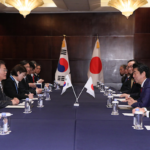Keio University Professor Kamo Tomoki analyzes the present state of Japan-China relations.
The rapid increase in China’s national strength is giving rise to a massive change in the balance of power throughout the Western rim of the Pacific, and these changes are now having a very large impact on regional order. As countries situated in this region and having the world’s second and third largest economies, China and Japan are expected by the international community to bear grave responsibilities with respect to the peace and prosperity of the regional and global order.
In recent years, however, China and Japan have been unsuccessful in building the kind of relationship that the international community expects of them. Dialogue between the political leaders of the two countries has been lacking, and the law enforcement agencies of both have been confronting each other in the East China Sea. A Maritime and Aerial Communication Mechanism between China and Japan is desperately needed so that any confrontation in the East China Sea can be managed, but although Chinese and Japanese leaders confirmed this in November of 2014, consultations toward creating such a mechanism have not moved forward. Far from contributing to regional and world order and prosperity, the present state of Japan-China relations has become a grave source of risk.
The governments of both countries well understand the severity of this problem. However, improving the present situation will not be easy. It will be a long journey requiring unremitting effort.
Changing the Balance of Power in East Asia
Japanese Foreign Minister Kishida Fumio visited Beijing between April 29 and May 1. The minister did not visit China in order to participate in an international conference but to make the first bilateral visit to China in four and a half years. The fact that the Japanese government decided to send Kishida to China and the fact that China accepted the visit should be understood as one small indication that both nations are strongly determined to improve ties.
Japan’s policy regarding China is clear. First, as set forth in the 2013 Cabinet decision on National Security Strategy, Japan’s position is that the “external stance and military activities of China, coupled with a lack of transparency in its military affairs and security policy, have become an issue of concern to the international community including Japan; therefore, the Government of Japan needs to pay careful attention to this situation.” One present policy is that of dialogue, which Foreign Minister Kishida referred to in his speech entitled, “A New Era in Japan-China Relations.”
Foreign Minister Kishida said that the respective positions of Japan and China in the global community’s balance of power have changed. In this context, the present age is one in which China and Japan, which have the second and third most powerful economies in the world, bear a heavy responsibility for the peace and prosperity of the region and of the world. Based on this understanding, and notwithstanding the issues and concerns between them, he said that the sole option for both countries, which are neighboring nations and unable to move, is to work with each other in order to contribute to the world through friendship and cooperation. The foreign minister acknowledged that the Japan-China relationship has become difficult to manage wisely and that it is easy for friction to emerge precisely because the two nations are close neighbors. For these reasons, patient efforts are necessary. He also confirmed that building the kind of relationship suited to this new age is in the interest of the people of both nations and would also meet with the hopes of the region and the world.
Anxiety toward China
This speech by Foreign Minister Kishida accurately reflects the feelings of the Japanese public toward China. As is well known, the affinity which the Japanese public feels toward China has deteriorated rapidly. According to a public opinion poll carried out by the Cabinet Office in January of this year, 83.2% of respondents said they felt no affinity toward China. One of the principal reasons has been the anxiety created among the Japanese people by the external actions of China in recent years. The Cabinet Office conducted a public opinion poll in January of last year in order to determine the feelings of the Japanese public regarding the defense of Japan. When asked what concerns they had with respect to the peace and security of Japan, some 60.5% responded that they were concerned about the modernization of China’s military and the activities of China on the seas. This answer far exceeded responses such as the situation on the Korean Peninsula, the actions of international terrorist organizations and the posture of the American military around Japan.
Nevertheless, the attitude of the Japanese public toward China is not one of universal anxiety. The Japanese people also keenly understand the importance of Japan’s relationship with China. The above January, 2016 poll also asked respondents whether they felt further development of relations between China and Japan in the future would be important for both countries, for Asia and for the Pacific region. Some 73.3% of respondents said they believed it was indeed important. The Japanese people thus share a strong sense that it is important for Japan to have stable and developing relations with China. The foreign minister’s speech succinctly and clearly articulated the feelings that the Japanese people have toward China.
Chinese Perspectives
Messages sent by China also stress the importance of Japan-China relations. When Foreign Minister Kishida visited China, he was met by China’s Foreign Minister Wang Yi and State Councilor Yang Jiechi, with whom he held discussions. But he was also accorded the opportunity to pay a courtesy call on State Council Premier Li Keqiang. The fact that Premier Li received the minister’s courtesy call on a holiday hints of the commitment of the Chinese side.
In the meeting of foreign ministers, however, the Chinese did not hide the feelings of irritation and distrust they felt toward Japan. Foreign Minister Wang stated that, if relations between the two countries were repeatedly at loggerheads, it was because Japan, while spreading the idea that China was a threat or that the Chinese economy was in decline, adopted an openly confrontational attitude toward China. He then called for “sincere” actions on the part of Japan.
After visiting China, Foreign Minister Kishida visited Thailand, Myanmar, Laos and Vietnam, while Prime Minister Abe at the same time visited Italy, France, Germany, Britain and Russia. China regards these visits as part of a strategy aimed at China to underline and follow up on the implementation, at the end of March of this year, of the security legislation adopted by the Diet in September of last year. With regard to the arbitration between the Philippines and China concerning the South China Sea, China sees Japan’s actions as intended to play up the issue and sees Japan as interfering in the issue more actively than any other country in the world. In other words, China sees Japan as trying to confine China.
Protecting the Peace and Prosperity in East Asia
The Japanese government has never formally spoken of China as a threat. Within Japan, however, the public is united in having a low sense of affinity toward China together with a sense that China is an important country, indicating that anxiety regarding China is spreading. But this should not be seen, as widespread commentary in China shows it is seen, as reflecting Japanese anxiety over the weakening of Japan’s national power, nor should it be seen in the context of a simplistic rivalry toward China expressing anti-China feelings precipitated by the rise of a country that was formerly looked down upon. Among the Japanese public there is a growing anxiety that, as a result of changes in the balance of power in the region brought about by the rise of China, China may undermine the international order which has protected the peace and prosperity of Japan. The anxiety toward China mentioned above is thus a reaction to the potential destabilization of Japan’s peace and prosperity.
In the postwar era, the Japanese people have advanced together with the international community and traveled along the road toward prosperity with other countries. The heart of that security has been the U.S.-Japan alliance, which forms the centerpiece of the Japan-U.S. security system. More than sixty years ago, Japan chose this path at its own initiative. Moreover, it is clear now that this decision was the right one. Japan has not been the only country that has benefited from this system. The United States has benefited, and needless to say, the entire Asian region has benefited as well. For precisely this reason, the Japanese view the actions of China toward the United States and the nations of the East China Sea as involving serious problems which challenge the peace and prosperity of the region.
According to the Chinese narrative, China’s actions are seen as necessary in order to ensure China’s own security and development. In discussions with Chinese researchers in international politics, I often hear it suggested that Japan’s stance of contributing proactively to peace under the principle of international cooperation is one example of a shift by Japan away from the pacifism of the past and that Japan’s diplomatic peace and security strategy may potentially have a negative impact on the stability of the environment around China.
This divergence between the Chinese and Japanese views reflects a divergence between their respective views about what it is that has protected the peace and prosperity of the region. This disagreement then gives rise to a divergence in their respective schemes for the future order of the region. In other words, present Japan-China relations reflect the competing views of the two nations on the best scheme for future order in the region. This geopolitical relationship between China and Japan highlights the need for the two nations to change their bilateral relationship from one of confrontation to one of cooperation. For this reason, the two countries must spare no efforts in closing the perception gap in their bilateral relationship and maintain channels for dialogue toward collaboration and cooperation. But at the same time, it is essential that the United States and Japan firmly maintain a balancing policy which checks problematic actions on the part of China and lets China pay the costs, that they reaffirm the value of the widespread benefits arising from the Japan-U.S. alliance in maintaining regional peace and prosperity, and that they work to strengthen the effectiveness of these benefits. This is the course which Japan has taken.
KAMO Tomoki is a professor in the Faculty of Policy Management at the Graduate School of Media and Governance, Keio University.








